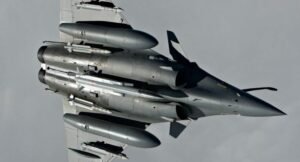Sixty-four years ago, during the height of Cold War tensions, French President Charles de Gaulle reportedly asked John F. Kennedy whether the U.S. would be willing to sacrifice New York to protect Paris. Kennedy never directly answered, instead emphasizing that the key was making the Russians believe it would.
Now, in 2025, that same question looms large once again. French President Emmanuel Macron has invited European allies to consider a similar proposition—only this time, France would be the one providing nuclear protection.
A Response to U.S. Uncertainty
In a prime-time speech on Wednesday, Macron addressed growing fears about Europe’s security, particularly in light of U.S. actions under President Donald Trump. Not only has Trump cut off Ukraine from crucial military aid in its fight against Russia, but he has also echoed Russian propaganda blaming NATO for the war and made no demands for Moscow to halt its aggression.
With Vladimir Putin’s Russia posing an increasing threat to European security, Macron proposed discussions on whether France’s nuclear arsenal could serve as a deterrent for the entire continent.
“I want to believe that the United States will remain by our side, but we must be prepared if that is not the case,” Macron said.
Unlike the United Kingdom, which relies on American missile technology and is closely integrated with U.S. nuclear systems, Macron stressed that France’s nuclear forces are entirely independent.
“It is completely sovereign and entirely French,” he said. “However, in response to the historic appeal of the future German chancellor, I have decided to open strategic discussions on the protection of our European allies through our deterrence.”
Can France’s Arsenal Cover Europe?
Russia currently has the world’s largest nuclear arsenal, with over 5,500 warheads, followed by the U.S. with just over 5,000. France, by comparison, has only 290, while the U.K. has 225.
However, experts argue that nuclear deterrence isn’t just about the number of warheads—it’s about credibility. The real question, says David Blagden, an expert in international security at the University of Exeter, is whether a French president would genuinely risk Paris to protect a city like Tallinn, Estonia.
During the Cold War, NATO strengthened deterrence by stationing American, British, and French troops in West Berlin as a “tripwire,” ensuring any Soviet attack would trigger a full-scale Western response. Whether a similar approach would work today remains uncertain.
Between France and the U.K., Blagden argues that France is better positioned to provide a nuclear umbrella for Europe. Unlike Britain, which relies solely on submarine-launched missiles, France has multiple nuclear delivery methods, including air-launched warheads that can be stationed in allied countries as a deterrent.
Currently, the U.S. has nuclear weapons stationed in Germany, the Netherlands, Belgium, Italy, and Turkey. In theory, those same nations could host French nuclear weapons instead, but doing so would carry significant risks.
“It’s possible,” Blagden says, “but it ultimately depends on France’s willingness to bear the potential escalatory consequences.”
Skepticism and Russian Reaction
Not everyone is convinced that France can—or should—take on this role.
Pavel Podvig, an independent nuclear analyst based in Geneva, argues that the entire concept of nuclear deterrence is flawed. He doubts that any country, including France, would truly be willing to risk its own destruction to protect another nation.
“Throughout the Cold War, Europeans always had doubts about the strength of the American commitment,” Podvig told CBC News.
He believes peace was maintained not by the threat of nuclear war, but by diplomatic norms, agreements, and understandings between superpowers.
Meanwhile, French politicians from across the political spectrum have insisted that France’s nuclear weapons will remain under the sole control of the French president, no matter what agreements emerge.
Germany’s likely next chancellor, Friedrich Merz, has welcomed Macron’s proposal, as have leaders from the Baltic states, Denmark, Poland, and Sweden.
Predictably, Russia has reacted with hostility. Russian Foreign Minister Sergey Lavrov called Macron’s comments a direct threat, warning that France’s ambitions to become Europe’s nuclear “protector” would not make the continent safer.
“This will not strengthen the security of France or its allies,” the Russian Foreign Ministry said in a statement.
A New Strategic Reality
The uncertainty surrounding U.S. commitments to NATO has sparked fears across Europe. Ukrainian General Valerii Zaluzhnyi, now Ukraine’s ambassador to the U.K., has warned that NATO’s survival is in question.
“Washington’s failure to recognize Russian aggression is not just a challenge for Ukraine—it is a challenge for all of Europe,” he said in a speech at London’s Chatham House.
He went even further, arguing that both Russia and the U.S. are now actively dismantling the global security order.
If NATO’s credibility collapses, Blagden warns, Europe could find itself in a Cold War-style scenario, where Russia holds the upper hand in conventional military forces, and the West must rely more heavily on nuclear deterrence.
“NATO is only as strong as the belief that its members—especially the most powerful one, the United States—will act to defend each other,” Blagden said.
If that belief falters, Europe may have no choice but to look elsewhere for protection—even if that means placing its trust in France’s nuclear shield.

 English
English




























































